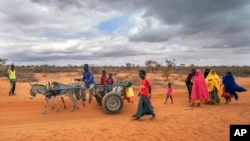Aid workers in Somalia say they are concerned about a likely reduction in humanitarian support as the country grapples with its worst drought in decades.
Donor fatigue compounded by multiple crises around the world that also require humanitarian support could reduce the level of funds Somalia appeal receives, the aid workers say.
“The main reason why there's a donor fatigue is because, as you can imagine, Somalia has been receiving humanitarian assistance for over three decades now and the situation has not been changing,” said Mohamed Abdi, country director for the Norwegian Refugee Council.
“Many of the donors who have been paying money, a lot of money for that matter, to support Somalia will definitely get tired when they see their effort not bearing any fruits,” he said.
Abdi said many donors will pay to alleviate the suffering of Somalis but will also be supporting other humanitarian causes in countries including Yemen, Syria, Turkey and Ukraine.
“And of course, many European donors will prefer to support the Ukrainians because it is close to their countries and some of them are really feeling the effect of the war,” he said.
The Somali government and humanitarian agencies recently appealed for $2.6 billion to assist about 7.6 million people in 2023. The appeal comes amid warnings that famine is a strong possibility if rains in the spring underperform and if humanitarian assistance is not sustained.
A spokesperson for the United Nations Office for Coordination of Humanitarian Affairs (OCHA) told VOA that needs are increasing in Somalia while donors are warning that there will be less funding this year.
OCHA’s appeals for donor support to Somalia in the last two years have fallen short of their goals.
OCHA said for 2021, 78% of the $1.09 billion appeal was received. Last year’s initial appeal of $1.46 billion was increased to $2.27 billion to meet the needs of 7.6 million people. Out of that, 67% was funded.
“An anticipated reduction in funding for humanitarian assistance in crucial sectors is part of the calculus for the famine projection from April to June,” the spokesperson said.
Abdi said the Norwegian Refugee Council, which sought $40 million last year to support people who have been affected by drought, received about 40% of it.
“Definitely we’ll not be able to reach the number of people that we have planned to reach if we are not getting assistance from humanitarian donors,” he said.
The United States remains the single largest donor of humanitarian aid to Somalia.
A U.S. Embassy official in Mogadishu told VOA that the U.S. government has contributed about $1.3 billion in assistance to the country since October 2021.
The official said Washington will continue to fund a “robust” humanitarian response in 2023 — but cannot meet Somalia’s humanitarian needs alone.
“The generous resources that the American people have given to this response to date have been integral in saving lives and preventing the onset of famine and widespread mortality,” the official said. “However, we cannot do this alone and are calling on all donors to do their part to help sustain and further scale up the humanitarian response to ensure that assistance continues at the levels necessary.”
Somali and U.N. officials say they hope European and Arab countries will step up with support. And they stress that the sooner the funding is received, the better they will be able to respond to the crisis.
“We need the money early, otherwise there is a prediction that we will face famine and a very high number of people will be facing starvation,” said Reena Ghelani, the U.N. Famine Prevention and Response coordinator who recently visited Somalia.
Ghelani says people are starving now because aid donations were delayed last year. She urged donors to respond ahead of the crisis.
Following a visit to Mogadishu last month, U.S. Ambassador to the U.N. Linda Thomas-Greenfield said swift action with humanitarian assistance was needed in Somalia.
“Speed saves lives, scale-ups prevent deaths, it’s that simple,” she said. “But unfortunately, we have not yet averted famine. We've delayed it, we postponed it, but the threat still looms large.”




